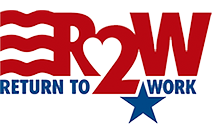Barriers to Employment and How to Overcome Them
By
Nikki DAgostino, CESP, R2W Career Counselor
The United States Department of Labor defines barriers to employment as ‘any conditions that may make employment difficult.’ Barriers can especially affect individuals with disabilities, who already may have a lack of resources available.
Some of the most common employment barriers include transportation barriers and criminal record barriers. These barriers can inhibit a person’s ability to keep and maintain employment.
When seeking employment, either by oneself or with the assistance of an employment program, it is important to assess potential barriers and come up with a game plan on how to overcome them. While not all barriers can fully be overcome, many can, and there are many techniques, resources, and methods that can be implemented to mitigate the overall impact of the barrier.
For example, when someone lacks transportation resources when searching for employment, they can utilize several methods to overcome the barrier. First, they can utilize Google Maps to determine what local employers may be within walking or biking distance of their residence. They can research state and county public transportation options, including disability door to door services for qualified individuals with disabilities. Networking, including utilizing resources through friends, family members, local non-profits, and carpooling groups can also be an excellent option. Lastly, rideshare services can also be utilized, when necessary, but proper budgeting and planning should be implemented.
Having a criminal background can also be a difficult barrier to overcome, particularly for individuals with prior felony convictions or convictions that include violence or theft. Employers do reserve the right to make hiring decisions based on prior convictions and can legally decline employment based on background check information. It is important when an individual has a criminal record to be upfront and truthful about the record – particularly if the employer indicates their intention to run a background check. By being forthcoming and truthful about what will come up on the background check, it can help open up a dialogue with management, where exceptions and accommodations can be made.
It is also extremely important to review the background check authorization paperwork as well. Some employers will only run a 7-year background check, or a 10-year background check. If the paperwork specifically indicates “have you had any convictions within the last 7 years” and your conviction was eight years ago, then it is perfectly acceptable to indicate ‘no’ on that paperwork.
In addition, many companies are taking initiatives to be more inclusive for individuals with backgrounds to help reintegrate previous offenders back into the workforce. There are many online resources available for offenders, including sources that specify different employers’ policies and hiring practices when it comes to individuals with criminal records. In addition, the construction fields, restaurant / culinary fields, and self-employment fields have always been great career fields for individuals to enter who may have more difficult criminal convictions.
Overall, with the proper preparation, acknowledgment, and guidance, one can learn to overcome a variety of barriers and attain successful employment outcomes.
DONATE HERE

Jalali Hartman, R2W Trustee, Former R2W Director



